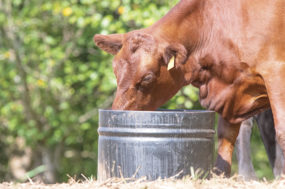The response? “Oh, I’d love to get some cows sometime. It’d be such fun. What a great way to live. I’ve always lived in town.”
I almost laughed. Out loud.
Instead, I bit my tongue and changed the subject.
You know, it’s not that ranching isn’t a great way to live – it is. It can also be fun. As I’ve said before though, Hollywood sheds very little light on how ranching actually works. Many people have this romantic notion of homegrown food, no set work hours and enjoying sunsets on the porch while playing the harmonica.
Recently, a multimillionaire gentleman found himself bankrupt after using his millions to buy ranches. Granted, his land practices were rough, and there were other factors involved. However, there’s more to ranching than meets the eye. We’ve certainly learned a lot.
So I’ve compiled a list of 15 ideas folks could attempt if they want to become a rancher. Maybe you’ve seen the parenting memes that suggest if you want to become a parent, you should walk over a brick of Legos to get ready for the parenting adventure. Ideas to get you ready to become a rancher aren’t much different …
So you want to be rancher?
15. Work three jobs, but don’t collect a paycheck for a year. Make an educated guess as to the amount of said paycheck.
14. Take that paycheck and cut it by at least 50% because the rest will go toward expenses – land payments, cattle loans, mineral, equipment expenses and the like.
13. Work 15-hour days. Use all the muscles in your body for at least eight of those hours.
12. Roll around in some manure.
Ranchers don’t actually do this of course, but if you haven’t been squirted by a calf or had to grab a tail in the chute or stuck your arm in tight places to preg check … you haven’t had enough exposure to cattle.
11. Plan a day of fun. Cancel it. Plan another day. Cancel it again. Do this at least three times.
Ranchers often have to cancel plans due to unforeseen circumstances, such as a broken fence. You can’t just leave cattle out on the road or in the neighbor’s pasture – you have to put them back. (That’s why we learn to have fun with most of the work we are doing.)
10. Buy a tractor. Get something on it fixed.
9. Stand out in subzero temperatures to practice feeding cattle.
8. Work outside in 90ºF to 100ºF temperatures. Best option: Lift at least 50 pounds repeatedly while outdoors. Then stick your head in a bucket of cold water. This is great irrigating practice.
7. Read all you can about ranching. Believe half of it.
6. Practice fencing: Dig holes. Set posts in these holes. The posts must not move. String at least three strands of wire down them. The wire needs to be tight. Or put woven wire on it for sheep. Practice fencing. Fence your yard, your neighbor’s yard, your family’s yard, a local church, your favorite fishing hole. A good fence determines how long your days are.
5. Lie or be constantly resilient to all opposition.
At a recent cattle convention, the majority of attendees reported feeling optimistic about the upcoming year. This happens on a regular basis. Even after natural disasters, economic downturn and drought, producers tend to say they feel positive about the upcoming year. Either we are all lying, or we are the most resilient group of people on the face of the planet.
4. Practice explaining the benefits of agriculture in simple steps. This includes researching the effects of cattle on the ozone layer – people will ask.
3. Throw dirt on the floor of your house. Don’t sweep it up for a week.
There is often a lot of running in and out of the house with muddy boots – but not a lot of time to sweep it up.
2. Sleep less.
1. And the No. 1 thing you ought to do if you want to be a rancher – fall in love with agriculture.
The only way you keep doing the above is because of passion. Sometimes passion isn’t enough because life happens. But people involved in agriculture tend to find their passion again, even if they lose it at some point or have to borrow their neighbor’s passion for a while. Passion is a must in ranching.
We know that ranching, when done well, is profitable. However, there are hard things that happen, and the perks must outweigh the hard times.
There are perks aplenty: good work ethic, strong kids, tenacity, land and animal connections, tax write-offs, visible progress, great “office environment” and yes, beautiful sunsets.
I have yet to play the harmonica though. ![]()







